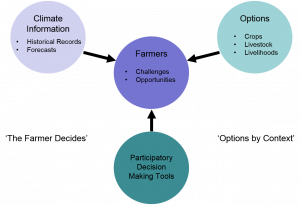What is PICSA?
Participatory Integrated Climate Services for Agriculture (PICSA) is a participatory approach for climate services and agricultural extension, developed by researchers at the University of Reading. PICSA aims to support smallholder farmers to make informed decisions under variable and changing climatic conditions. It does this through combining: i) accurate, locally-specific climate and weather information, ii) locally relevant crop, livestock and livelihood options, and iii) participatory decision-making tools.
The Challenge
Smallholder farming is vital for the food security and livelihoods of millions of people across the developing world. However, critical farming decisions depend on highly variable climatic factors such as the amount of rain that falls, extreme temperature, the timing of seasonal changes, as well as the occurrence of extreme conditions like dry spells and floods. Farmers thus face substantial risks and difficult decisions when planning their activities.
The PICSA Approach
PICSA places farmers at the centre of its approach, and helps them to address the above challenges through integrating:
- Communication of historical climate information, as well as seasonal and short term forecasts, in a way that is relevant and useful for farmers.
- Exploring crop, livestock and livelihood options available to farmers that may help them deal with climate and weather-related challenges.
- Using participatory decision-making tools that assist farmers to make informed decisions when planning their activities.
The PICSA Approach

The PICSA Principles
PICSA promotes farmer empowerment through two guiding principles:
- ‘The Farmer Decides’ – farmers are best placed to make decisions about their agricultural practices, because they have detailed knowledge of their farm, system and environment, and they also face the consequences (whether favourable or unfavourable) of their decisions.
- ‘Options by Context’ – different farmers have different contexts. This includes differences in wealth, education, land, goals and attitudes to risk. Therefore, what works for one farmer might not work for another. Farmers should thus make decisions that are right for their own contexts.
In practice, 12 logical steps make up the PICSA approach. Agricultural field staff implement these steps with farmers, starting long before the growing season, then continuing shortly before, during, and after the season. See our Resources page for more details on the steps.
History
PICSA began in 2011 when researchers from the University of Reading used participatory research methods to explore historical climate data with farmers in Zimbabwe. The farmers indicated the methods were useful for helping them make decisions, and so the researchers developed them further to create PICSA. The PICSA field manual formalised the approach in 2015, and can be found in our Resources page. PICSA has experienced a surge in interest and demand from regional organisations, governments and non-governmental organisations. As a result, it is now being implemented in more than 20 countries and reaching tens of thousands of farmers worldwide.
